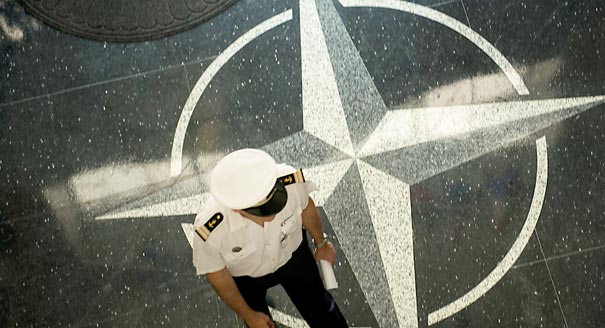When Anders Fogh Rasmussen was appointed NATO secretary general in August 2009, the organization’s ambassadors were far from pleased. For the first time in the history of the U.S.-led military alliance, the member states had chosen a serving prime minister. Most previous NATO bosses had been drawn from national defense ministries.
The choice of Rasmussen, a Dane, made a big difference. It meant he had the ear of other leaders, precisely because he had been one himself. And he ran NATO as he had governed Denmark: sternly and from the top down.
As Rasmussen prepares to leave office after this year’s NATO summit in the Welsh city of Cardiff, there is as yet no former or serving prime minister willing to throw his or her hat into the ring. Member states might have to agree to opt for somebody of lower rank.
Either way, pity Rasmussen’s successor. NATO is in bad shape, and morale is low. That is because of America’s changing attitude toward the alliance, the impact of the euro crisis on defense spending, and NATO’s uncertain future after the end of its combat mission in Afghanistan later this year.
Take U.S. President Barack Obama’s pivot away from Europe toward the Asia-Pacific region, a shift that one could have expected to take place much earlier. The move reflects only not America’s growing concern with the military rise of China but also its frustrations with Europe’s inability to create a strong security and defense policy. The U.S. administration, with its security guarantees for its allies across the Atlantic, is tired of being taken for granted by Europeans.
Yet within NATO, Washington’s changing attitude toward Europe and the transatlantic alliance has provoked no serious debate. It is as if the issue were taboo. Worse, it’s as if this strategic shift by the United States did not even affect NATO. Whoever takes over from Rasmussen will by necessity have to begin a major discussion about the meaning and durability of the transatlantic relationship. That will require a huge amount of support and input from Berlin, London, Paris, and Warsaw.
In Germany, Chancellor Angela Merkel has so far shown little interest in NATO. With her new coalition of conservatives and Social Democrats, that is unlikely to change. Foreign policy is now largely set by the Chancellery. As for defense matters, Ursula von der Leyen, the defense minister, will have her hands full in pushing through reforms within the ministry and the armed forces.
UK Prime Minister David Cameron is too focused on the 2015 British general election to take a major interest in NATO’s future. Even if he wanted to send his foreign minister, William Hague, over to NATO, Britain has little appetite for more wars. Remember Cameron’s humiliating parliamentary defeat over proposed military strikes against Syria. Furthermore, the economic crisis has decimated Britain’s armed forces and reduced their morale. Further cuts will curtail Britain’s role as an indispensable military player in NATO and the EU.
Things are not much better in Paris. True, French President François Hollande has made bold decisions to intervene militarily in Mali and the Central African Republic. But he has not been able to rely on NATO or the EU for military support.
As for Poland, it has its own frustrations with these two institutions. The government of Prime Minister Donald Tusk recognizes that NATO has been transformed from a collective alliance into a coalition of the willing. Yet the EU has been reluctant to react to that by strengthening its own security and defense policy, despite many attempts by Poland’s foreign minister, Radek Sikorski.
To make matters even worse for the incoming NATO secretary general, member states are not going to spend more on defense, and they are not going do more “smart defense,” the two drums that Rasmussen has kept beating. That is not just because of the consequences of the euro crisis. It’s also because, as a whole, Europeans do not feel threatened. And as long as they do not feel threatened, leaders will be unable to justify increasing defense budgets, or sharing military resources if that leads to job losses.
This perceived lack of a threat is self-delusional. Very real threats exist on Europe’s eastern borders and in the Caucasus—not to speak of the implications of the civil war in Syria and the deepening crisis in Egypt.
By turning a blind eye to these threats and by pretending that America’s security interest in Europe is permanent, European leaders are proceeding down a dangerous cul-de-sac. NATO’s new secretary general will need nerves of steel, a bold imagination, and the tongue of an angel to make them turn around.






